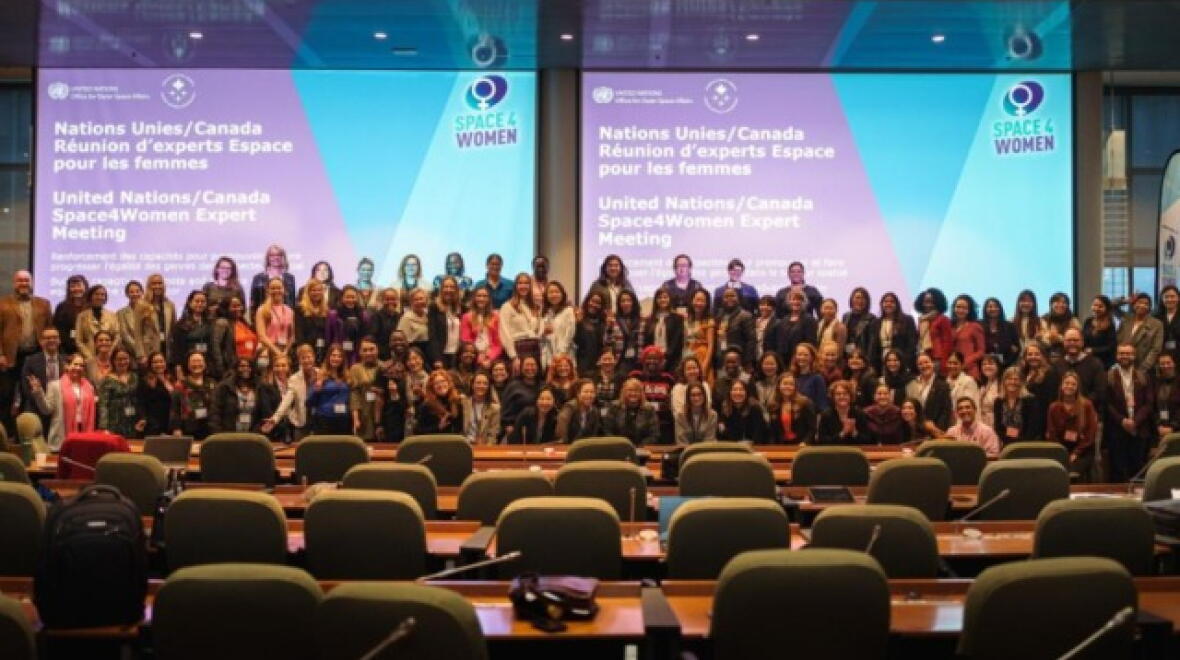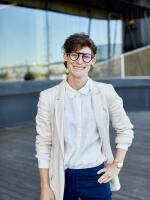How can we build capacity to advance gender equality in the space sector?
By: Alice Gorman, Catherine Grace, Cassandra Steer, Elise Stephenson and Stephanie Wan
Posted on
In November, we attended the 2023 Space4Women Expert Meeting in Montréal, Canada. The meeting was part of the Space4Women project, which aims to encourage women and girls to pursue Science, Technology, Engineering, and Mathematics (STEM) education and raise awareness about career opportunities and the importance of gender equality and empowerment in the space sector.
Hosted by the United Nations Office for Outer Space Affairs (UNOOSA) and the Canadian Space Agency (CSA), this was the fourth Expert Meeting in a series that began in 2017 and the theme for this year was “Building capacity to promote and advance gender equality in the space sector". As the Australian contingent for this international meeting, we wanted to capture key insights from the discussions and share these with the broader Australian space community as a basis for reflection and action. So, we have written a report sharing key takeaways for the Australian space sector based on our personal views and experiences at the meeting (this should act as a supplement to the Space4Women meeting recap and resources, which you can read here).
While the meeting covered a wide variety of issues and themes, a few stood out as particularly applicable for the Australian context:
- Better data collection and analysis are needed: Industry surveys, produced every few years, have shown that Australia is in step with the global figures, at around 16-20 % women. However, there is little further detail to draw upon beyond this figure, reinforcing the importance of GIWL researcher’s work in understanding women and minoritised groups’ experiences in the space sector and the need to continue to invest in analysis and understanding.
- There is no “one-size-fits-all” approach for equality: Different approaches and solutions are needed in different political and cultural contexts; there is no single set of solutions. For example, in some countries the language of “empowering” and “inspiring” girls to work in STEM and space careers can be misappropriated by institutions whose structures and practices are discriminatory, to place the emphasis on what girls or women need to do better, instead of how to introduce inclusive educational and workplaces. However, in some other countries, there is a great need for parental empowerment and support of girls, explicit programmes providing pathways for girls, and access to examples of women who have broken with traditional expectations as inspiration. As such, initiatives should look to understand localised contexts, focus on fixing systems, not women, and adapting language and approaches as needed.
- We need to centre lived experiences: In the Expert Meeting, storytelling was a powerful tool to share real experiences. We heard that: women who call out discriminatory behaviour are often made to feel like they created the problem, and face backlash; many countries are slow to prioritise gender equality in the space sector, resulting in difficulties getting problems addressed; the notion that progress on gender equality is inevitable was not well-evidenced, with many participants desiring further tangible action; trans and gender diverse people felt even further marginalised by their space sector employees, and often did not have the international networks, protections, safety or voice to have their challenges considered.
- Intersectionality is key: focusing only on the need for gender diversity can mask the kinds of discriminations that LGBTIQ and non-binary gender identities, people of colour, and people with disabilities face in the same institutions.
In light of the discussions at the Expert Meeting, our recommendations for the Australian space sector are:
- There is a need for better and more nuanced quantitative and qualitative data, which records numbers, perceptions and experiences. Organisations in a position to collect this data include CSIRO, SIAA, and SASIC, as well as universities - such as the project already being led by the Global Institute for Women’s Leadership at the ANU.
- Given the growth in the Australian and New Zealand space sectors, we propose that Australia should host a Space4Women Expert Meeting in the next few years. There is no formal bidding process but interest has been registered with UNOOSA.
- There is an opportunity to lead an online Australia-led side event at the November 2024 Space4Women expert meeting. This may involve partnering with other organisations, for instance, Women in STEMM Australia, the National Space Society Women in Space Chapter, or the fledgling Australian Space Diversity Alliance, being launched in March 2024.
- There is an opportunity to lead diversity-focused side events at the 2025 IAC in Australia, and to advocate for a mainstreamed approach to diversity throughout the IAC programme, in particular by ensuring diverse speakers at plenary events.
- Both government, and industry have the opportunity to make tangible and public commitments to diversity and equality, and partner across the space sector to collect accurate and timely data that could help the Australian space sector thrive. This is the mission of the Australian Space Diversity Alliance, and we encourage stakeholders to join and support this network when it launches in 2024.


